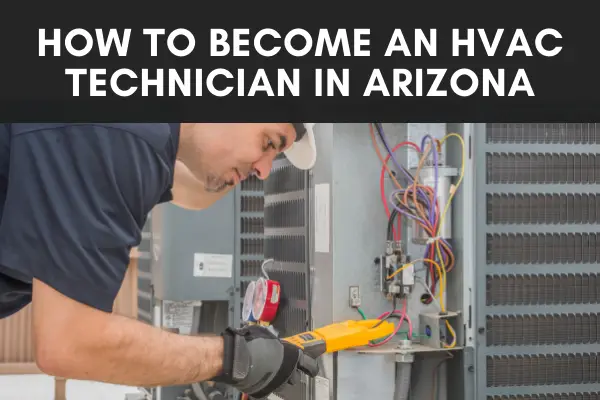If you’re looking for a career in Arizona with immense job opportunities and the possibility for growth, the HVAC field is it. Heating, ventilation, and air conditioning (HVAC) techs are expected to see a whopping 21% increase in job openings from now until 2028 in AZ.
This article will teach you how to become an HVAC tech in Arizona, as well as how to advance your career and receive your HVAC Contractor License in the state.
Do You need an HVAC License in Arizona?
HVAC techs completing work valued under $1,000 do not need a state license to work in Arizona. All American HVAC techs working with refrigerants (HVAC-R techs) should hold the Section 608 EPA Technician Certification. Some municipalities require licensing for journeyman HVAC techs, so be sure to check with your city before starting to work.
If you plan to work on any project valued over $1,000, you must either work for a licensed contractor or become a state-licensed contractor yourself.
HVAC Tech Job Description
HVAC techs have the knowledge to install, remove, repair, and maintain different ventilation, heating, and cooling systems. This work could range from fixing air conditioning units to completing ductwork on both old and new construction projects.
HVAC techs generally require postsecondary nondegree awards to begin their careers. They experience long-term on-the-job training. While the general job outlook across the U.S. is average at a 5% growth rate, HVAC techs in Arizona are seeing more than quadruple that percentage, offering plenty of opportunities for employment in the field.
The median pay for HVAC techs in the U.S. was $48,630 in 2021; however, HVAC techs in Arizona are paid more at $52,380 plus overtime. For those in Surprise or Glendale, you can even see average salaries in the $58,000 range.
Becoming an HVAC Tech in Arizona
To become an HVAC tech in Arizona, you must complete a postsecondary program or apprenticeship after high school. This will give you the classroom and practical knowledge you need to work on private residences, commercial buildings, and all types of construction.
Postsecondary programs are also called trade school programs and many can be found at your local community college. You can find programs that range from half a year in length to two years, with some culminating in an associate’s degree.
HVAC techs-in-training can also apply for apprenticeships. These give you classroom hours in combination with paid work experience. You’ll gain thousands of hours of experience on the job, usually spread over four years. Many apprenticeships are registered with the state, giving them more credibility.
HVAC Certifications
If you plan to work with refrigerants, you’ll first need to complete an approved program and receive your EPA Section 608 Technician Certificate. This certification is required for HVAC-R techs in all 50 states.
Many HVAC techs also seek out additional certifications to spruce up their resume. Some well-known organizations that certify HVAC techs nationally include the North American Technician Excellence (NATE) training academy and the American Society of Heating, Refrigerating and Air-Conditioning Engineers (ASHRAE).
HVAC Licenses
While there is no state license for HVAC techs in Arizona, some cities offer journeyman HVAC tech licenses. You can verify if this applies to you by researching or calling your city’s licensing board.
Phoenix, for example, requires journeyman HVAC techs to receive a city license. This means that, if you fulfill the requirements, you will apply for this license after you complete your program and before you begin working as an HVAC tech in Phoenix. The city also offers an Apprentice License for HVAC apprentices.
Applying for HVAC Tech Jobs
Once you are trained and certified – if applicable – you are ready to enter the HVAC workforce in Arizona. You can seek out jobs on the typical networks (Monster, Indeed, and ArizonaWork), making sure you are properly supervised by a licensed contractor if you will be working on any projects valued at over $1,000.
HVAC Contractor Job Duties
Licensed HVAC contractors in Arizona are responsible for HVAC work priced over $1,000. These contractors can hire HVAC techs and supervise trainees or apprentices. This license is given by the Arizona Registrar of Contractors.
HVAC contractors in the U.S. earn an average of $90,100, with the potential to earn six figures depending on experience and location. HVAC contractors start out earning $71,000 in Tucson and $78,900 in Phoenix, plus overtime.
Becoming an HVAC Contractor in AZ
Arizona has different requirements for HVAC contractors applying as an LLC or for those applying as a sole proprietorship. This article will focus on the process for those applying as sole proprietors.
Classifications and Requirements
Arizona offers dozens of contractor classifications to choose from when applying for the required examination(s). HVAC contractors may choose between the following classifications listed below with their required years of experience and test names:
- Specialty Commercial Contracting
- Boilers, steamfitting, and process piping: 4 years, SRE & T exams
- Air conditioning and refrigeration: 4 years, SRE & T exams
- Refrigeration: 4 years, SRE & T exams
- Comfort heating, ventilating, evaporative cooling: 2 years, SRE & T exams
- Boilers, steamfitting, and process piping, including solar: 4 years, SRE, T, & S exams
- Air conditioning and refrigeration, including solar: 4 years, SRE, T, & S exams
- Specialty Residential Contracting
- Boilers, steamfitting, and process piping: 4 years, SRE & T exams
- Air conditioning and refrigeration, including solar: 4 years, SRE, T, & S exams
- Air conditioning and refrigeration: 4 years, SRE & T exams
- Specialty Dual License Contracting
- Boilers, steamfitting, and process piping: 4 years, SRE & T exams
- Air conditioning and refrigeration: 4 years, SRE & T exams
- Comfort heating, ventilating, evaporative cooling: 2 years, SRE & T exams
- Boilers, steamfitting, and process piping, including solar: 4 years, SRE, T, & S exams
- Air conditioning and refrigeration, including solar: 4 years, SRE, T, & S
Once you have chosen your classification(s), you can schedule your exam. You may want to complete this state-recommended course to prepare you for the exams.
Once you pass your exam(s), you’ll need to submit a background check and copies of your government-issued ID.
Then, show proof of your bond and pay all fees. You are now ready to complete your application and wait for approval or denial from the state.
For more information on the state’s licensing procedure, see here.

